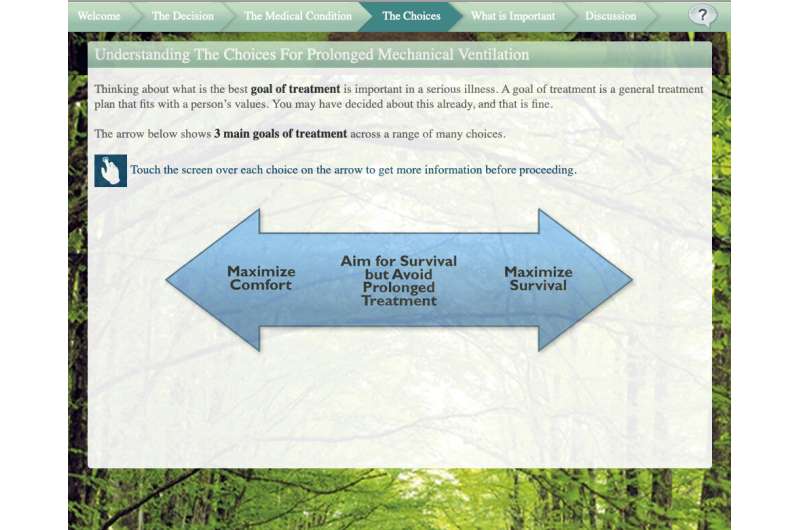Decision-making tool fails to ease anxiety for families of life-support patients

Every year, the families of more than 400,000 patients on prolonged life support in intensive care units across the U.S. face weighty decisions about their loved one's recovery and whether to end life-sustaining care.
The patients can't speak for themselves and often haven't made their end-of-life wishes known, leaving these heavy choices to families.
Using a computer-based guide to personalize these decisions can help families feel less conflicted, according to research led by Duke and published in the Annals of Internal Medicine.
However, the treatment guide—a tool commonly called a "decision aid" in health care—did not ease symptoms of depression, anxiety or post-traumatic stress for the decision-makers as they oversaw their loved one's care, researchers found. The randomized clinical trial included 416 decision-makers for 277 patients who had been on life support at least 10 days.
"In some outpatient situations, decision aids can help people make better-quality decisions," said Christopher E. Cox, M.D., the study's lead author and an ICU doctor at Duke. "Therefore, there has been a hope that decision aids could revolutionize complex and expensive hospital-based health care by improving communication with clinicians, shortening the length of the hospital stay and reducing symptoms of distress that are common among those who have to make serious decisions on behalf of a loved one."
These benefits have been observed for non-critical patients who have used decision aids to decide whether to have surgery or how best to screen for certain conditions, Cox said. But little research has been done in a critical care setting, he said.
In the ICU, surrogate decision-makers must consider the patient's values, spiritual beliefs, and often life-and-death scenarios, such as whether the patient would prefer to focus on comfort as opposed to continuing aggressive treatment, with the high likelihood of diminished cognitive ability or independence.
Going through the roughly 30-minute guided computer program did not appear to change whether the decision-maker advocated for aggressive medical care or appeared to favor comfort, or palliative, care, the researchers found.
There was also no difference in outcomes between patients whose caregivers used the guide and those in a control group who didn't use it; hospitalization length and death rates were similar between both groups.
Researchers were surprised to see a division between the guide's recommendations and the family's choices. Family caregivers answered questions about the patient's values, then the guide made treatment recommendations based on that information. Yet more than half of the family caregivers disregarded the guide's recommendations in favor of more aggressive treatment.
The research suggests families with loved ones on life support might need more or different resources to weigh the risks, benefits and costs associated with the patient's care, and how to best represent the wishes of patients unable to speak for themselves.
"We're going to have to rethink this approach for acute care, which is where a majority of health care expenditures occur," said Cox, who collaborated with faculty from the University of Pittsburgh, the University of Washington, the University of Colorado, and the University of North Carolina at Chapel Hill.
"The hospital is one of the hardest places to make these decisions, so perhaps we need an approach that adds more emotional support or a structured role for clinicians to play while family members complete the decision aid," Cox said.
More information: Annals of Internal Medicine (2019). DOI: 10.7326/M18-2335

















